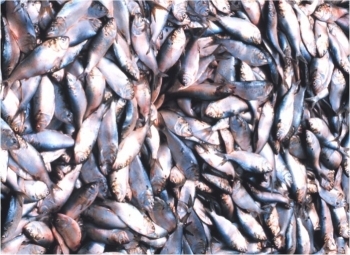Ecological Economics (main)
From The Encyclopedia of Earth
Ecological Economics
========
-
 Featured Article
Featured Article  Deforestation (Ecological Economics)Deforestation is the destruction or clearing of forested lands, usually for the purposes of expanding agricultural land or for timber harvesting. When the process is conducted by... More »
Deforestation (Ecological Economics)Deforestation is the destruction or clearing of forested lands, usually for the purposes of expanding agricultural land or for timber harvesting. When the process is conducted by... More »
Recently Updated
 Deforestation (Ecological Economics) Last Updated on 2014-11-09 17:48:51 Deforestation is the destruction or clearing of forested lands, usually for the purposes of expanding agricultural land or for timber harvesting. When the process is conducted by clearcutting (removal of most or all of the canopy tree growth, leaving few or no live or dead trees standing) or when mass forest burning occurs, significant losses of habitat and biodiversity may result, including the erosion of biological community structure and the extinction of species. Deforestation is proceeding at a rapid pace in may areas of the world, especially in the tropical and boreal forest regions of the earth, with annual net loss of forests during the 1990s estimated in the range of nine to sixteen million hectares per annum. Large scale deforestation may have adverse impacts on biosequestration of atmospheric carbon dioxide, exacerbating greenhouse gas buildup, through the release of stored... More »
Deforestation (Ecological Economics) Last Updated on 2014-11-09 17:48:51 Deforestation is the destruction or clearing of forested lands, usually for the purposes of expanding agricultural land or for timber harvesting. When the process is conducted by clearcutting (removal of most or all of the canopy tree growth, leaving few or no live or dead trees standing) or when mass forest burning occurs, significant losses of habitat and biodiversity may result, including the erosion of biological community structure and the extinction of species. Deforestation is proceeding at a rapid pace in may areas of the world, especially in the tropical and boreal forest regions of the earth, with annual net loss of forests during the 1990s estimated in the range of nine to sixteen million hectares per annum. Large scale deforestation may have adverse impacts on biosequestration of atmospheric carbon dioxide, exacerbating greenhouse gas buildup, through the release of stored... More »  Biophysical economics (Ecological Economics) Last Updated on 2010-05-26 03:55:57 Biophysical economics is characterized by a wide range of analysts from diverse fields who use ecology and thermodynamics to analyze the economic process. The history of biophysical thought is traced from the 18th-century Physiocrats to current empirical research, with emphasis on those individuals who contributed to the development of biophysical economic theory. Attention is also given to a critique of the neoclassical theory of natural resources from a biophysical perspective, and how recent empirical biophysical research highlights areas of neoclassical theory which could be improved by a more realistic and systematic treatment of natural resources. Many of these critiques have roots in a broad body of research known as biophysical economics, the basic tenets of which are the focus of this analysis. Biophysical economics begins with a conceptual model that sees the economy... More »
Biophysical economics (Ecological Economics) Last Updated on 2010-05-26 03:55:57 Biophysical economics is characterized by a wide range of analysts from diverse fields who use ecology and thermodynamics to analyze the economic process. The history of biophysical thought is traced from the 18th-century Physiocrats to current empirical research, with emphasis on those individuals who contributed to the development of biophysical economic theory. Attention is also given to a critique of the neoclassical theory of natural resources from a biophysical perspective, and how recent empirical biophysical research highlights areas of neoclassical theory which could be improved by a more realistic and systematic treatment of natural resources. Many of these critiques have roots in a broad body of research known as biophysical economics, the basic tenets of which are the focus of this analysis. Biophysical economics begins with a conceptual model that sees the economy... More »  Green careers (Ecological Economics) Last Updated on 2010-04-24 03:20:27 Evolution of the green careers concept A green career is a post with upward mobility, which contributes to sustainable use of resources, reduces waste and pollution, or otherwise benefits the environment. Only until recent years, for most people the idea of green jobs or green careers would have likely been limited to work in a natural science or natural resource area. This earlier perception included jobs such as a forester, natural resource manager, or a researcher studying one of the many facets of the natural world such as botany, ecology, wildlife biology, and ecosystem functioning. A clearer perception of the finite nature of each of the Earth's resources has emerged in the last several decades, especially regarding non-renewable energy resources based upon fossil fuels; furthermore, man has learned that the continuation of the resource consumption patterns of... More »
Green careers (Ecological Economics) Last Updated on 2010-04-24 03:20:27 Evolution of the green careers concept A green career is a post with upward mobility, which contributes to sustainable use of resources, reduces waste and pollution, or otherwise benefits the environment. Only until recent years, for most people the idea of green jobs or green careers would have likely been limited to work in a natural science or natural resource area. This earlier perception included jobs such as a forester, natural resource manager, or a researcher studying one of the many facets of the natural world such as botany, ecology, wildlife biology, and ecosystem functioning. A clearer perception of the finite nature of each of the Earth's resources has emerged in the last several decades, especially regarding non-renewable energy resources based upon fossil fuels; furthermore, man has learned that the continuation of the resource consumption patterns of... More »  Ecological Economics (collection) Last Updated on 2009-09-08 14:32:45 Ecological Economics is the science of sustainability. Ecological economics exists because a hundred years of disciplinary specialization in scientific inquiry has left us unable to understand or to manage the interactions between the human and environmental components of our world. While none would dispute the insights that disciplinary specialization has brought, many now recognize that it has also turned out to be our Achilles heel. In an interconnected evolving world, reductionist science has pushed out the envelope of knowledge in many different directions, but it has left us bereft of ideas as to how to formulate and solve problems that stem from the interactions between humans and the natural world. All contributions were written by credentialed ecological economists. Authors are welcome to expand on or edit the contents list; please contact Ida Kubiszewski with... More »
Ecological Economics (collection) Last Updated on 2009-09-08 14:32:45 Ecological Economics is the science of sustainability. Ecological economics exists because a hundred years of disciplinary specialization in scientific inquiry has left us unable to understand or to manage the interactions between the human and environmental components of our world. While none would dispute the insights that disciplinary specialization has brought, many now recognize that it has also turned out to be our Achilles heel. In an interconnected evolving world, reductionist science has pushed out the envelope of knowledge in many different directions, but it has left us bereft of ideas as to how to formulate and solve problems that stem from the interactions between humans and the natural world. All contributions were written by credentialed ecological economists. Authors are welcome to expand on or edit the contents list; please contact Ida Kubiszewski with... More »  Natural resource quality Last Updated on 2008-11-18 19:55:21 A natural resource is something that exists in nature which can be used by humans at current economic, technological, social, cultural, and institutional conditions. Natural resources are highly concentrated collections of energy and materials relative to other sources that we do not use. If you walked out your back door with a shovel and starting digging a hole, after a few meters you would hit bedrock—the Earth’s crust. If you chipped off a chunk of that rock, you would find tiny amounts of economically useful elements such as copper, lead, and phosphorous. In fact, you would find minute amounts of nearly all the 92 naturally occurring elements. But you couldn’t set up a viable copper mine in your backyard, or in the vast majority of other locations on the Earth, because the concentrations of copper in those locations are too dilute. The overwhelming majority of copper is... More »
Natural resource quality Last Updated on 2008-11-18 19:55:21 A natural resource is something that exists in nature which can be used by humans at current economic, technological, social, cultural, and institutional conditions. Natural resources are highly concentrated collections of energy and materials relative to other sources that we do not use. If you walked out your back door with a shovel and starting digging a hole, after a few meters you would hit bedrock—the Earth’s crust. If you chipped off a chunk of that rock, you would find tiny amounts of economically useful elements such as copper, lead, and phosphorous. In fact, you would find minute amounts of nearly all the 92 naturally occurring elements. But you couldn’t set up a viable copper mine in your backyard, or in the vast majority of other locations on the Earth, because the concentrations of copper in those locations are too dilute. The overwhelming majority of copper is... More » 